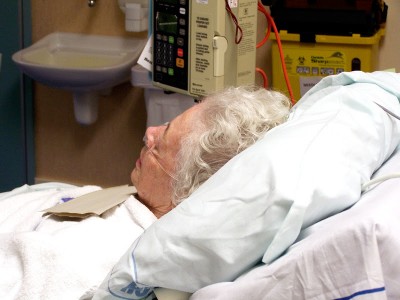We have written dozens of stories the common theme of which is that patients diagnosed in a “persistent vegetative state” or “minimally conscious” are either (a) misdiagnosed or (b) much more aware than they are given credit for. Terri Schindler Schiavo captured our hearts and our imaginations but she was by no means the only person starved and dehydrated to death based on a bogus diagnosis of PVS.
 A tip of the hat to bioethicist Wesley J. Smith who alerted his readers to an astonishing study published in the journal “Neuroimage: Clinical.” The headline will pique anyone’s interest:
A tip of the hat to bioethicist Wesley J. Smith who alerted his readers to an astonishing study published in the journal “Neuroimage: Clinical.” The headline will pique anyone’s interest:
“Patient in ‘vegetative state’ not just aware, but paying attention; Research raises possibility of devices in the future to help some patients in a vegetative state interact with the outside world.”
In a word, wow! Let’s dig deeper.
The research was conducted by scientists at the Medical Research Council Cognition and Brain Sciences Unit and the University of Cambridge. They examined 21 patients diagnosed to be in a PVS or minimally conscious and used as a control group eight healthy people. To track what was taking place in the brain, “researchers used electroencephalography (EEG), which non-invasively measures the electrical activity over the scalp.”
 Without getting too deeply into minutiae, the researchers were looking for what they called “attentive awareness.” By this they meant being “able to filter out unimportant information and home in on relevant words they were being asked to pay attention to.”
Without getting too deeply into minutiae, the researchers were looking for what they called “attentive awareness.” By this they meant being “able to filter out unimportant information and home in on relevant words they were being asked to pay attention to.”
One patient “in a seemingly vegetative state, unable to move or speak, showed signs of attentive awareness that had not been detected before, a new study reveals. This patient was able to focus on words signalled by the experimenters as auditory targets as successfully as healthy individuals.”
But there’s more. “Using brain imaging (fMRI), the scientists also discovered that this patient could follow simple commands to imagine playing tennis.”
In the explanation of the study, Dr Tristan Bekinschtein at the MRC Cognition and Brain Sciences Unit said a number of things beyond my limited knowledge. But the key quote is, “These findings mean that, in certain cases of individuals who are vegetative, we might be able to enhance this ability and improve their level of communication with the outside world.”
Wesley writes today, “If this is true of other patients, imagine the horror of hearing ones family discussing removing your food and water. Imagine the pain of the actual event!” He goes on to explain we do have knowledge of the horrible pain. He cites the case of Kate Adamson who underwent abdominal surgery with inadequate anesthesia because she was mistakenly thought to be unconscious after a brain stem stroke. But being unfed (although hydrated) “was more painful than the sensation of being cut open!”
CLICK LIKE IF YOU’RE PRO-LIFE!
Wesley completes his column by first quoting from “A Painless Death,” which he wrote in 2003:
_____________
In preparation for this article, I contacted Adamson for more details about the torture she experienced while being dehydrated. She told me about having been operated upon (to remove the bowel obstruction) with inadequate anesthesia when doctors believed she was unconscious:
“The agony of going without food was a constant pain that lasted not several hours like my operation did, but several days. You have to endure the physical pain and on top of that you have to endure the emotional pain. Your whole body cries out, “Feed me. I am alive and a person, don’t let me die, for God’s Sake! Somebody feed me.”
Unbelievably, she described being deprived of food and water as “far worse” than experiencing the pain of abdominal surgery. Despite having been on an on an IV saline solution, Adamson still had horrible thirst:
“I craved anything to drink. Anything. I obsessively visualized drinking from a huge bottle of orange Gatorade. And I hate orange Gatorade. I did receive lemon flavored mouth swabs to alleviate dryness but they did nothing to slack my desperate thirst.”
_____________
Wesley concludes:
“By the way, the take away from all this? Many will say these patients are suffering by knowing of their condition, justifying doctors to lethally inject, anesthetize and dehydrate, or kill by harvesting their organs. Indeed, some bioethicists already have.
“P.S: If someone you love is thought to be unconscious, assume they can still hear you. Stories of ‘unconscious’ people recalling all that went on around them are ubiquitous.”
LifeNews.com Note: Dave Andrusko is the editor of National Right to Life News and an author and editor of several books on abortion topics. This post originally appeared in his National Right to Life News Today —- an online column on pro-life issues.







